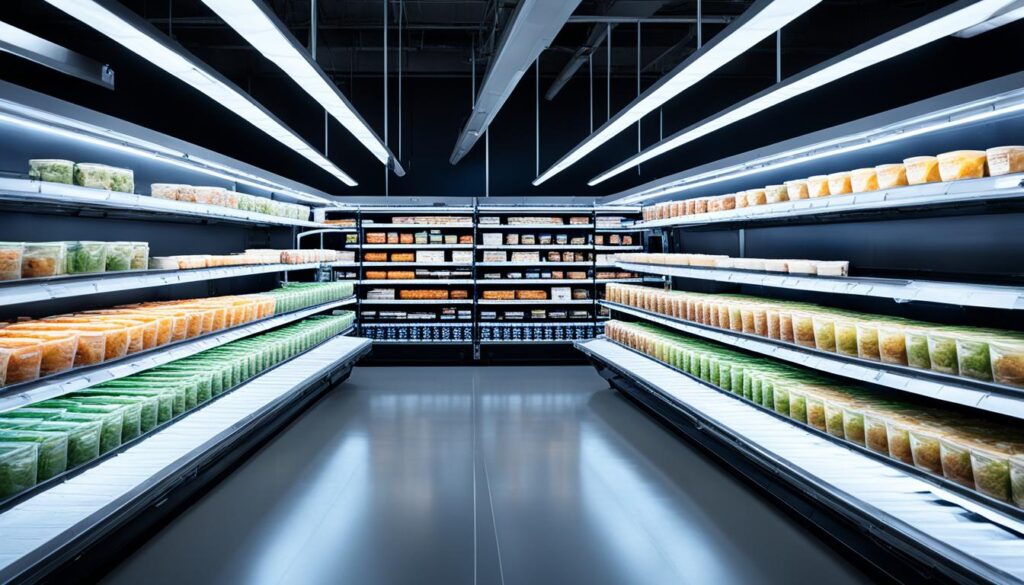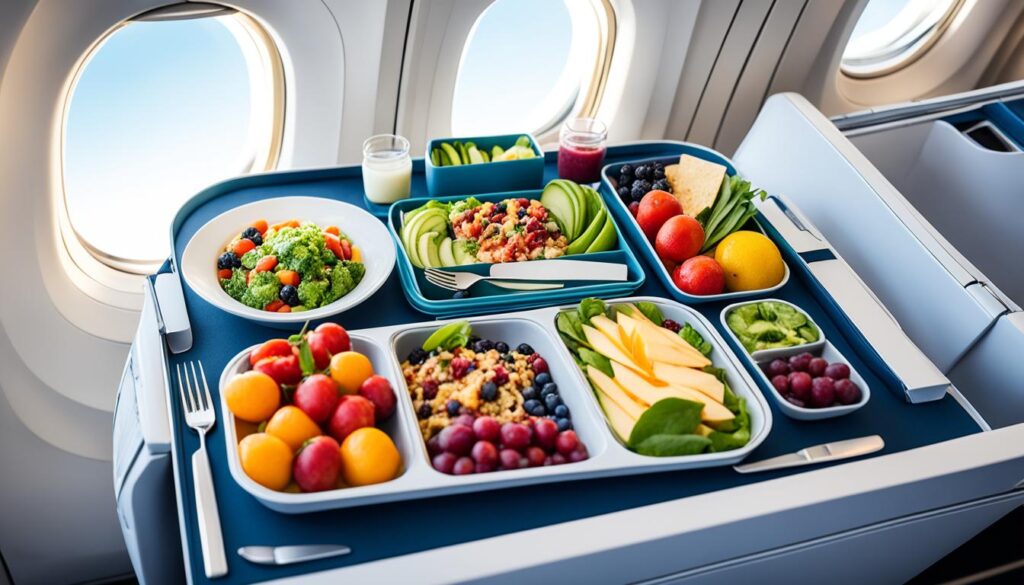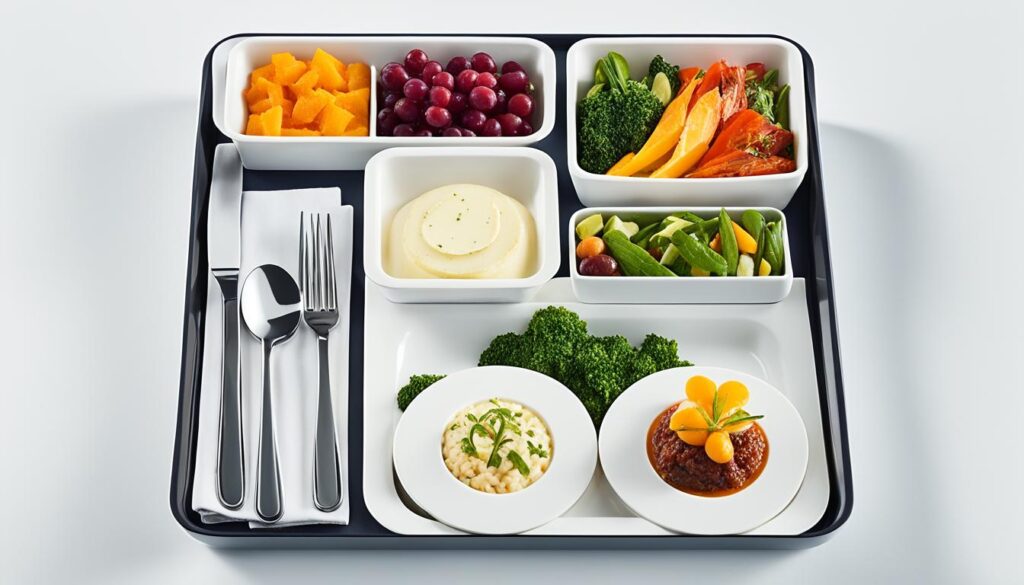Every day, over 5 million people fly, each with their own food likes and needs. As food trends and passenger diets change, airlines must rethink food service. Airline menu adaptation to add private label frozen food is vital. It makes flying dining better and keeps customers happy.
Brands like Fantasy Food Sp. z o.o. are changing in-flight food. They offer a range of healthy in-flight menu updates. Now, passengers can enjoy gluten-free pasta and vegan options. Keeping up with global food trends is key in travel hospitality.
Airlines are working hard to improve their food service. They want to stay ahead in the competitive market. Adapting to new diet trends is crucial. It will shape the future of airline food and keep passengers loyal.
Key Takeaways
- Understanding the dramatic rise in demand for diverse and health-conscious in-flight meal options.
- The importance of aligning airline menu adaptation with global food trends for passenger satisfaction.
- The role of private label frozen food in offering customized and nutritious choices for travelers.
- How partnerships with suppliers like Fantasy Food Sp. z o.o. contribute to innovative in-flight menu updates.
- Adapting to passenger dietary preferences as a key factor for airlines to maintain competitiveness and build loyalty.
Understanding Current Global Food Trends Impacting Airline Menu Selection
The aviation industry strives to improve passenger experiences. It does this by consulting with food and beverage consultants. These experts understand global food trends well. Trends now show a shift towards healthier, organic meal options.
Airlines are teaming up with food business advisory services. They aim to add these new health-focused food choices to their in-flight menus.
Frozen food branding
opens doors for airlines to offer healthier eating options. But, they must also keep meals interesting for world travelers. To succeed, airlines are utilizing
food marketing and branding strategies
. These strategies highlight both the health benefits and the unique tastes of their food.
Airlines are aligning with popular selections such as clean-ready meals. This meets passengers’ growing interest in eating well during flights. It takes careful menu planning and the help of consultants. These experts know the food industry inside and out.
Frozen food manufacturers play a key role too. They provide unique dishes and products. This helps an airline stand out. Partnering with these manufacturers can increase passenger satisfaction. Strong branding strategies are vital for showcasing these food choices effectively.
Airlines aim to create menus that mirror passengers’ changing preferences. This includes a mix of diverse and healthy food options. With expert help, airlines can navigate global food trends successfully. This makes them more competitive in the airline industry.
Airlines Responding to the Rise of Health-Conscious Travelers: A Dietary Shift
As more travelers look for healthy food, airlines are updating their menus. They now include healthy private label frozen food options. This change meets the needs of passengers who want meals that are both quick and good for them.
Airlines are working with nutrition experts to improve their food. They focus on custom frozen food options. This approach helps offer meals that are both tasty and good for you on flights.
„Responding to the demand for healthier in-flight meal options is not a trend; it’s a shift in our industry’s altitude towards passenger health and satisfaction. Elevating the standard of our offerings through nutritional consulting for food products leads to a win-win situation for both airlines and travelers.“
Here’s a look at what airlines now offer health-conscious flyers. We compare traditional options to healthier ones below:
| Traditional In-flight Menu | Health-Conscious Menu |
|---|---|
| Fried chicken with mashed potatoes | Grilled chicken with quinoa salad |
| Pasta in cream sauce | Whole-grain pasta with vegetable marinara |
| Standard beef burger | Plant-based burger with mixed greens |
| Chocolate cake dessert | Fresh fruit medley or yogurt parfait |
Airlines must continue to innovate in their meal offerings. They need to offer healthy private label frozen food that meets diverse needs. Innovating keeps passengers both healthy and happy.
- Continued investment in nutritional consulting for food products to create science-backed menu plans.
- Fostering relationships with suppliers to expand the range of high-quality healthy private label frozen food.
- Designing unique custom frozen food options that offer taste, nutrition, and satisfaction.
Airlines must focus on passenger health. This requires innovative approaches to food. Doing so ensures the flying experience is as good as the destination itself.
Building Partnerships with Private Label Frozen Food Suppliers
The airline industry is changing to better serve global travelers. They know it’s important to improve in-flight meals. A key way to do this is by working closely with private label frozen food suppliers. This helps them offer a wider variety of meals and guarantees high-quality frozen food packaging solutions. Fantasy Food Sp. z o.o. is a top choice for airlines. They offer innovative food options and custom branding.

By teaming up with companies like Fantasy Food Sp. z o.o., airlines can offer unique and varied menus. They benefit from the supplier’s expertise in white label frozen food services. This partnership leads to better in-flight meals, building passenger loyalty and setting the airline apart from competitors.
| Benefits | Private Label Options | Packaging Solutions |
|---|---|---|
| Customizable Branding | Health-conscious Selections | Eco-friendly Materials |
| Consistency in Quality | Ethnic Cuisines | Innovative Designs |
| Supply Chain Efficiency | Plant-Based Alternatives | Safe and Hygienic Standards |
| Competitive Differentiation | Seasonal Specialties | Branding Visibility |
Choosing the right partners is crucial for improving in-flight dining. Working with reliable private label frozen food suppliers like Fantasy Food Sp. z o.o. helps airlines exceed passenger expectations. These suppliers provide gourmet frozen products that enhance an airline’s menu.
Culinary Innovation: Airlines Collaborating with Food and Beverage Consultants
The airline industry is always looking for ways to stand out, and working with culinary and menu development consulting is key. Experts in new product development consulting for food businesses bring their love for food together with innovation. This makes the in-flight dining experience something special.
Working closely with consultants helps improve what passengers eat. It also brings in food technology innovation consulting to solve issues of serving great food high up in the sky. The teamwork between airlines and food experts results in amazing menus. These menus meet the need for something new while being practical about food storage and safety up in the air.
- Gourmet Selection Development: They create top-quality, delicious food choices. This makes the flight experience better and enhances the airline’s image.
- Cuisine Fusion: They blend global food trends into one, offering a taste of the world in every bite.
- Menu Optimization: They use their deep knowledge of what’s in season and what’s available regionally. This makes menus diverse and reliable.
- Sensory Enhancements: They adjust flavors to taste best at high altitudes, improving the dining experience.
Consultants also share key insights for making meals that not only taste good but meet today’s dietary needs. They focus on allergen-free options and organics, making sure all passengers find something they like.
This partnership changes how travelers experience food and boosts what airlines can do. By making the meal development process smoother, consultants help airlines quickly introduce exciting new food ideas. This transforms the quality of food served in the sky.
Optimizing Menu Planning With Expert Food Industry Analysis
The airline industry is always changing. Passenger likes and global rules shape in-flight menus. Using expert food industry analysis is key for airlines wanting to stay competitive and attract many types of customers. This deep understanding of food trends and what passengers want is crucial for making great menus.
Today, making customers happy is everything. Food sector strategic consulting plays a big role here. It helps airlines plan their menus with new food ideas and industry trends. Strategic consulting looks at market data and future trends. This helps airlines make menus that appeal to people from everywhere and meet their dietary needs.
Following strict rules is also part of planning menus. That’s where food industry regulatory compliance consulting is very important. Compliance consulting makes sure each meal not only tastes good but also is safe and clean. This is in line with more passengers caring about health and safety when they fly.
- Market trend analysis for menu diversification
- Strategic partnership identification for uniquely tailored food offerings
- Cost-optimization strategies for sourcing high-quality ingredients
- Regulatory compliance auditing for international culinary offerings
Linking food industry regulatory compliance consulting with strategic insights helps airlines. It lets them explore global dishes smartly and safely. This mix of skills makes sure menus are delicious and show care for passengers. It all leads to a memorable experience in the sky.
Meeting Consumer Demand: The Role of Frozen Meal Suppliers in Aviation
In the fast-paced aviation world, frozen meal suppliers play a key role. They help airlines give passengers a great eating experience. Working with frozen food distributors, they make sure travelers enjoy a wide range of tasty and healthy options. This matters more today because people care about what they eat, even when flying.
Strong partnerships rely on expert food retail and distribution consulting. Consultants improve the way airlines pick and serve their meals. They fix any supply issues and make sure food meets what passengers want. Let’s look at how these efforts pay off by examining the table below:
| Supplier Attribute | Benefit to Airlines | Impact on Passengers |
|---|---|---|
| Variety of Meal Options | Addresses diverse dietary preferences | Increases satisfaction with in-flight dining |
| Consistent Quality Assurance | Builds trust in meal safety and hygiene | Enhances comfort and peace of mind |
| Efficient Logistics | Reduces food waste and operational costs | Ensures fresh and appetizing meal choices |
| Adherence to Nutritional Standards | Satisfies health-conscious consumers | Supports well-being during travel |
The partnership between airlines and frozen meal suppliers gets stronger with frozen food distributors. This teamwork keeps up with what travelers want. It puts airlines at the heart of food innovation and keeps passengers happy high in the sky.
Personalization of Food Options with On-Demand Airline Services
Modern travelers enjoy dining in the skies thanks to on-demand airline services. These services use food export and international market entry consulting to offer diverse meals. This help airlines offer dishes from around the world while following food safety rules.
To make flying more enjoyable, airlines offer custom frozen food solutions. These meals are tasty and cater to all dietary needs. It makes flying feel like dining out, with many choices for everyone.
- Food export strategies that target international culinary diversity while maintaining strict quality standards.
- Customization of frozen meals that emphasize flexibility in menu design and passenger satisfaction.
- Private label grocery products that align with branding and personalized in-flight dining solutions.
Airlines offering private label grocery items focus on unique passenger tastes. This shows their high-quality service and attention to detail. Every dish, from starters to desserts, is chosen to make flying special.
Airlines are no longer just carriers; they have become curators of fine dining experiences, matching the altitude with aptitude in catering to personal tastes and preferences.
The combination of private label grocery choices and custom frozen food solutions changes airline service. It brings personal touch to meals, making air travel more than just a trip. Passengers can look forward to meals that are tailored just for them.
Adapting to New Norms: Responding to Post-Pandemic Dietary Preferences
As we move forward from the pandemic, the airline industry faces challenges and opportunities. New health and safety rules have changed what people want to eat. Services like food processing and engineering consulting are key in making meal prep and packaging safe. Food industry sales representation also plays a crucial role. They help airlines offer the latest and best food choices that meet new safety standards.
FMCG brokerage firms are also very important now. They help launch new food products that meet higher cleanliness standards. These firms work as a bridge between food producers and airlines. This speeds up the introduction of innovative dining options on flights. FMCG brokers keep up with what travelers want. This ensures a quick response to the changing preferences in food.
- Consulting on innovative food processing and packaging methods to elevate in-flight safety standards.
- Strategic alignment of product offerings with consumer demand for individual and sanitary meal options.
- Expertise from FMCG brokerage services to assist airlines in swiftly integrating new products and practices.
The post-pandemic world brings many challenges in logistics and public relations. Airlines need to work hard to keep their customers’ trust. The advice from food processing and engineering consultants is more valuable than ever. Together with strong sales representation and partnerships with FMCG brokers, they are crucial. They help airlines offer safe, enjoyable, and clean food to their passengers.
Capturing the Ethical Consumer Market with Sustainable and Eco-Friendly Food Choices
In today’s world, environmental concerns shape how people buy things. Airlines have a chance to become more sustainable. This is possible thanks to sustainable private label food suppliers. They provide eco-friendly frozen food options that help our planet. By offering these foods on flights, airlines show they care about our future.
Moving to sustainable actions also means looking at packaging. Food packaging solutions consulting can help airlines find green packaging solutions. This helps build a good image among passengers who value sustainability.
Aligning with eco-friendly frozen food options and sustainable practices is more than a trend; it’s a strategic edge that caters to the discerning ethical consumer.
Today, people prefer to consume responsibly, and airlines can lead in this. By working with sustainable private label food suppliers, they can offer menus that are good for the planet. These menus also meet high standards for taste and quality.
Eating on planes is now about supporting the traveler’s values, not just convenience. This change benefits both the earth and the airline’s business.

Sourcing and packaging in eco-friendly ways can boost an airline’s image. With food packaging solutions consulting, airlines can tackle sustainability in every meal served. This consulting looks at the environmental impact of dining, finding ways to reduce waste and make customers happy.
The path to greener airline dining is clear. It involves choosing sustainable options, sourcing responsibly, and always looking for new ideas. Airlines that take this path will attract more customers who care about the earth. These customers want to support businesses that match their commitment to the planet.
Assessing and Reacting to Real-Time Food Business Growth Strategies
To stay ahead in the airline game, it’s crucial to get food business growth strategies right. These strategies change to match what people like to eat. Airlines need the help of food brokerage services to deal with complex supply chains and market trends.
Working with a skilled food sales broker gives airlines a big network of suppliers and food ideas. This partnership is key for airlines to quickly adapt to new food trends. A wholesale food broker can help get better prices and quality ingredients. This is important for creating new menus that travelers from all over the world will love.
Here’s a table showing how food brokers help airlines match food with what passengers want:
| Passenger Demand | Brokerage Service Impact | Outcome |
|---|---|---|
| Health-conscious Options | Connect airlines with suppliers of organic and nutritional meals. | Menu diversification with healthier options. |
| Diverse Dietary Preferences | Facilitate sourcing of specialized meal ingredients such as vegan or halal. | Enhanced passenger satisfaction and loyalty. |
| Seasonal Menus | Provide market analysis on seasonal produce and trends. | Dynamic, seasonally updated in-flight menus. |
| Cost-Effective Sourcing | Leverage bulk buying and negotiate better pricing. | Improved cost management without compromising quality. |
| Innovative Meals | Introduce airlines to cutting-edge food technologies and ingredients. | In-flight dining becomes a distinctive feature of the airline. |
By choosing the right food brokerage services, airlines can lead the way. They can develop food business growth strategies that attract customers from all over the globe.
Conclusion
The airline industry is always changing to keep up with global food trends. It’s clear that success lies in using many strategies and working together. Airlines can offer a wide variety of gourmet foods by working with retail and distribution brokers. It’s important to create menus that are healthy, ethical, and sustainable. This also means following local and international rules.
Airlines are now working with special private label frozen food suppliers. This means they can be ahead of the curve, not just reacting to trends. This shift shows a big commitment to doing things well. The improved food on flights shows how dedicated these companies are to making changes, predicting what passengers want, and working with food experts.
Airlines that balance keeping meals simple but satisfying with meeting special dietary needs will be ahead of the game. They’ll focus on ethical sourcing, nutritional value, and keeping up with food trends. This will move the industry towards a future where all meals on a flight show the amazing variety of foods from around the world. It will make eating during a flight memorable and responsible.

